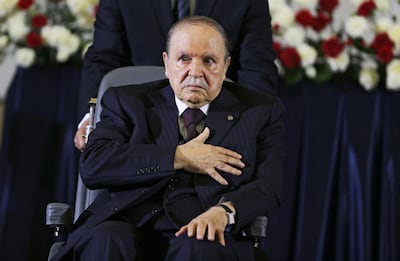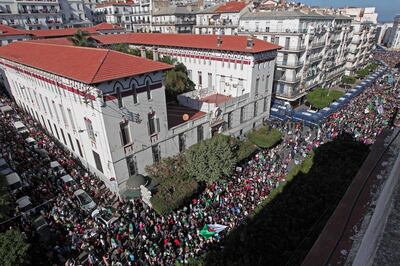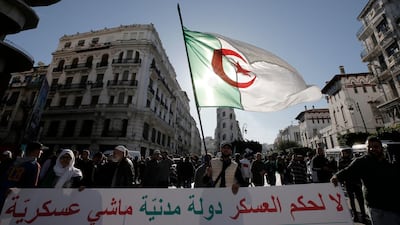For more than 40 weeks, an unprecedented and entirely peaceful protest movement has united millions of Algerians in a call for democratic change. Dubbed the Revolution of Smiles, this national outcry for a more hopeful future has resulted in a presidential election. After two postponements, it is now scheduled to take place next Thursday. Yet Algerians do not hold much optimism that the poll will bring significant change.
The reality is that the election shows no sign of offering real reform. On the contrary, it has all the makings of a reaffirmation of a system whose leaders refuse to change, and which puts vested interests ahead of the vast majority of Algeria's 43 million citizens.
To understand the election’s full significance, we need to go back to February, when crowds first took to the streets to express their frustration at the decision of their veteran leader, Abdelaziz Bouteflika, to stand for a fifth presidential term.
Mr Bouteflika is 82 and – more than anyone else still living – personifies the extraordinary development of modern-day Algeria. He fought for freedom against French colonialists and celebrated victory over them in 1962, and he called for unity throughout an 11-year civil war that only ended in 2002. Despite ongoing regional unrest, he was able to end emergency rule in 2011.
This highly intelligent and supremely patriotic politician spent two decades serving Algeria as head of state, to the extent that he wanted to carry on indefinitely. This was not only a foolish ambition but one that exposed the major faultline underlying the entire Algerian establishment: failing to keep up with the times.
Brutal conflict certainly requires a tough, uncompromising commander, who can maintain discipline with an obedient military. The remnants of the Bouteflika regime are still known as “Le Pouvoir” – or “the power” – a shadowy collective of army and intelligence officials who deploy soldiers and police to ruthless effect. Veterans of the war against the French were revered for decades but the public mood is now very different indeed.
Algerians no longer see themselves as a post-war society – one trying to restore some semblance of stability after the loss of millions of lives and the destruction of masses of infrastructure. Instead, Algerians feel a part of a young nation. Most were born after 1962 and those reaching adulthood now will have no recollection of the civil war. The under-30s make up 70 per cent of the population. They are looking to define themselves beyond the sombre cliches of militarism and a repressive security state.

To give Mr Bouteflika his due, he accepted all this when he finally resigned as president in April. The Hirak (protest) movement and its Revolution of Smiles had convinced him that the world was changing rapidly, and that Algeria needed to as well. Protests that were as loud and passionate as those organised by peace demonstrators during the civil war signalled widespread dissatisfaction.
Mr Bouteflika's surrender to the annals of history was soon followed by other highly significant moments. These included the September conviction of the ex-president's younger brother, Said Bouteflika. He was sentenced to 15 years in prison, along with former military and police chiefs, ministers and businessmen.
These cases did not represent the exit of the old order, however. While the defendants were found guilty of corruption and using their links with the Bouteflika regime to advance their own interests, the precise charges were “undermining the authority of the army” and “conspiracy against the authority of the state”.
Their trials lasted just two days and were typical of the rubber-stamping processes that characterised judicial and political life under Mr Bouteflika. In other words, knee-jerk authoritarianism has by no means gone away.
The anachronistic Mr Bouteflika and a few of his immediate cronies might have disappeared but the often highly secretive and unaccountable establishment has not. This is why dissenters have continually called for the entire ruling elite to go. They also want viable political institutions to be built before supposedly democratic elections are held.
Polls were not credible under Mr Bouteflika. He always won with ludicrously high majorities – usually above 80 per cent – while those who questioned them too vociferously could expect to come up against Le Pouvoir.
Now it is still a military man – lieutenant general Ahmed Gaid Salah – who is viewed as being by far the most influential power-broker in Algerian politics. He has promised honesty and justice in the December 12 election but many remain unconvinced.

Instead they believe the five candidates standing to become Algeria's new president represent nothing more than establishment operatives. The fear is that all five will do all they can to maintain a system based on clientelism that keeps the profits from the nation's immense resources in the hands of a few.
Algeria is a hugely influential player in the world’s economy and has the potential to be even more powerful. It is the globe’s sixth-largest gas exporter and ranks 16th in oil reserves but there is a pressing need for it to diversify away from its reliance on hydrocarbons.
The high spending of recent years that has increased the country’s deficit and unbalanced budgets is unsustainable. According to the World Bank, GDP growth is expected to be 1.3 per cent this year – down from 1.5 per cent last year (when GDP was $173.75 billion) – due to “political uncertainty”.
Those hoping to succeed Mr Bouteflika include two of his former prime ministers – Abdelmadjid Tebboune, 74, and Ali Benflis, 75. Then there is ex-culture minister Azzedine Mihoubi, 60, and one-time tourism minister Abdelkader Bengrine, 57. The fifth man is Abdelaziz Belaid, the 56-year-old leader of the Front El Moustakbal party, which he founded in 2012 as an offshoot of the Front de Liberation Nationale (FLN).
The FLN is the traditional establishment party that has dominated Algeria, thanks to the ascendancy of Le Pouvoir. That all five candidates are so closely linked to the party is telling. All are compliant politicians who have served their time and show no inclination to challenge those who currently run the security-led state.
Just as significantly, they display little enthusiasm for implementing the kind of radical reform that is needed to revitalise Algeria. Mass unemployment and endemic corruption are all symptoms of an economic malaise that has intensified because of plummeting oil and gas prices.
Moves were under way to scale down a welfare state providing low-paid, unproductive jobs for life, along with cheap housing, petrol, food and health care. The cost of all this, combined with the red tape, is no longer considered workable. The idea was to create a more competitive country that could take on global giants.
The largest country in Africa by land mass is predominantly state-managed and the uncertainty caused by Mr Bouteflika's downfall has frozen progress. Bosses of many of the biggest companies are unable to sign paycheques or order essential materials from abroad because of investigations into alleged law-breaking.
An interim government has been forced to hold back strategic initiatives originally forged by the Bouteflika administration. These include creating jobs outside the enormous public sector and winding down state subsidies. Also on hold is an energy law aimed at boosting production at the state-owned oil company Sonatrach – the largest company in Africa, and one with 154 subsidiaries.
Algeria is heavily dependent on its oil and gas sector. It provides more than 90 per cent of export earnings and up to 60 per cent of its budget but income fell by more than 6 per cent in the first six months of this year to $17.5bn.
All of these problems require democratic solutions, not ones aimed at benefitting a complacent clique, backed by an armed force. In these circumstances, the prospect of change following the election does not inspire any kind of confidence.
Whatever the result of the election – and it is currently impossible to predict which institutionalised figurehead will emerge as the winner – dissatisfaction will intensify. A popular uprising has ensured superficial change but Le Pouvoir’s natural reflex is to prevent a transition to genuine democracy. In which case, the Revolution of Smiles will continue unabated.
Nabila Ramdani is a French-Algerian journalist and broadcaster who specialises in Islamic affairs and the Arab world

